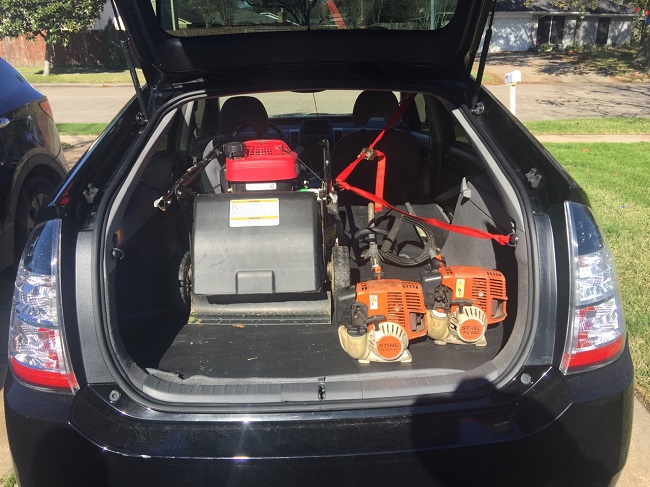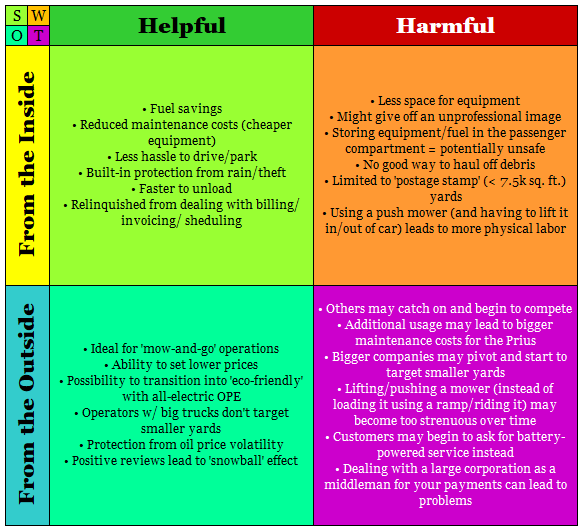Landscaping... in a Prius??
by Black Ink Team

Like every good hunter knows, the greater he knows his prey the greater his chances for having a successful hunt. The same principle applies for dealers. The better a salesperson knows the customer (what needs they have, how much they likely have to spend, which sales tactics work best on them, etc.) the greater their chances for closing the deal. Social media is a resource that can be used to learn aboutcustomer behavior.
A forum user on LawnSite - a community of landscaping professionals - recently shared his experience doing work in a new and somewhat unique way: he is using a Prius as a work vehicle and mainly utilizing online platforms to find clients. His proposed ‘business model’ swiftly came under attack.
The user (who goes by ‘envirocleanhouston’) says that he recently moved and has been a landscaper for ten years. After moving, he decided to adopt new strategies, because they would better fit his personality and the local market for his services. Since Houston is an urban sprawl with lots of traffic and many people who have smaller lawns, he argues, it wouldn’t make sense to drive around a pickup, tow a trailer, and own larger pieces of equipment.
envirocleanhouston owns a Honda 21” mower, which he places inside his Prius through its trunk opening. The hybrid is fitted with a custom-made liner, he says, to prevent oil and gas from getting into the fabric. Even with the mower he has room to bring along plenty of other tools, he says, and the Prius automatically locks when he takes away the key so it protects his equipment from theft.

Having worked with a 16’ trailer in the past, the user claims that it is a hassle to drive a truck equipped with one through traffic. Furthermore, he states that some customers live on streets where a landscaper simply could not park a truck equipped with a trailer. This gives him a competitive advantage, he wagers - with his Prius he drive quicker and park virtually anywhere.
By connecting with clients through online platforms, envirocleanhouston saves on marketing and has less paperwork to worry about, he says. The platforms act as advertising, since people who use them can easily find his business, and they also handle invoicing/billing/scheduling for him. Apparently, nobody has left him a bad review, which helps to drive business.
Lots of people commended the user, for finding an approach that suited his lifestyle and environment - but many more criticized him. One of the points he was repeatedly called out on was the fact that the improved gas mileage the Prius had did not have as a big of an effect as he was arguing it did. Several forum users postulated that gasoline only accounted for 3 to 5% of a landscaper’s expenses over any given year, therefore his savings couldn’t be too substantial. Also, driving a smaller vehicle to save on gas, many pointed out, limits the size of properties you can service because then you can only fit smaller equipment.
envirocleanhouston defended himself, by arguing that a landscaper with a trailer and bigger equipment has to spend much more on maintenance. After all, trailers get flats all the time, he said, and ride-on mowers frequently need new parts which can be expensive.
Users pointed out that the Prius would hinder more than help envirocleanhouston’s business, by reducing his operations to mowing and light trimming. His car couldn’t haul away very much debris, they argued, and clients pay more for getting their land cleared. envirocleanhouston came back with he was aware that his business would be limited, but there is enough demand for just mowing services he feels and he doesn’t want to be doing bigger jobs anyway.
This case study illustrates that some professional customers do things a bit differently. Rather than service and spare parts, envirocleanhouston’s biggest boon to dealers would be new machines, as he said he plans on replacing his mowers instead of fixing them. If the dealer he goes to doesn’t recognize his unique needs, log them, and plan accordingly they risk tarnishing their relationship (by treating him as an average professional). For keeping track of customers’ varying needs, a CRM can be useful.
